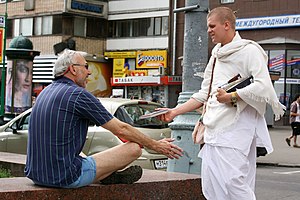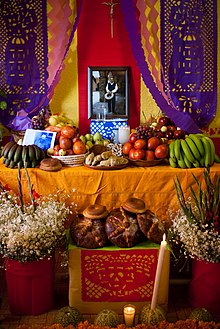Portal:Religion
The Religion Portal
Religion is a range of social-cultural systems, including designated behaviors and practices, morals, beliefs, worldviews, texts, sanctified places, prophecies, ethics, or organizations, that generally relate humanity to supernatural, transcendental, and spiritual elements—although there is no scholarly consensus over what precisely constitutes a religion. Different religions may or may not contain various elements ranging from the divine, sacredness, faith, and a supernatural being or beings. (Full article...)
 Vital article
Vital article

A new religious movement (NRM), also known as alternative spirituality or a new religion, is a religious or spiritual group that has modern origins and is peripheral to its society's dominant religious culture. NRMs can be novel in origin, or they can be part of a wider religion, in which case they are distinct from pre-existing denominations. Some NRMs deal with the challenges that the modernizing world poses to them by embracing individualism, while other NRMs deal with them by embracing tightly knit collective means. Scholars have estimated that NRMs number in the tens of thousands worldwide. Most NRMs only have a few members, some of them have thousands of members, and a few of them have more than a million members. (Full article...)
 Did you know (auto-generated)
Did you know (auto-generated)
- ... that the nonconformist minister Ichabod Chauncey was banished from England under the Religion Act 1592 and spent two years in exile in Holland where he published a defence of his actions?
- ... that in her 2021 book White Evangelical Racism, professor of religion Anthea Butler called American evangelicalism a pro-Trump, "nationalistic political movement"?
- ... that Musa va 'Uj depicts figures from all three Abrahamic religions?
- ... that fictional religions, often described in speculative fiction, have in some cases inspired real religious movements?
- ... that a religious community is a group of people who practice the same religion, but do not have to live together?
- ... that Gamaliel's principle has been used to support religious pluralism and reforms within religious groups?
In 1984, 751 people suffered food poisoning in The Dalles, Oregon, United States, due to the deliberate contamination of salad bars at ten local restaurants with Salmonella. A group of prominent followers of Rajneesh (later known as Osho) led by Ma Anand Sheela had hoped to incapacitate the voting population of the city so that their own candidates would win the 1984 Wasco County elections. The incident was the first and is still the single largest bioterrorist attack in U.S. history. (Full article...)



































































